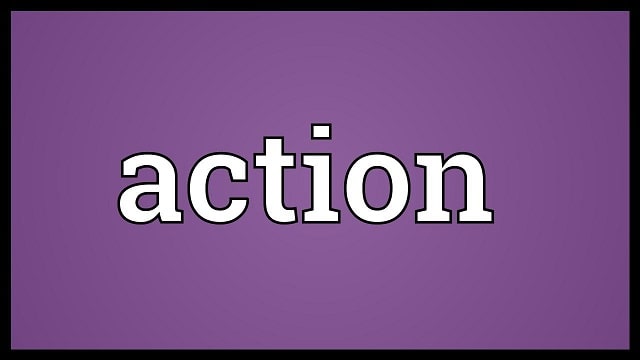Action Meaning
The word Action (to act) is a regular, non-pronominal verb of the first conjugation, which designates the beginning of the action of something, that is, to begin the start-up of some mechanism, which may be a mechanical or institutional device.
For example: “He applied the brake to stop the vehicle, but it did not work, and the collision occurred”, “The action of the mills achieved the grinding of the wheat”, “The action of the wind moved the leaves of the trees”, “The action of justice is slow and expensive, in money, and in psychophysical energy” or “All mechanisms were activated to achieve traffic control and prevent the fugitives from escaping” or “The alarm was activated by accident, and it frightened all the neighbors.”
In the legal field, to take action means the initiation of a legal action, initiated by the aggrieved party (complainant) or ex officio, to seek justice for the commission of a crime, in the case of criminal action; or to recognize a right or resolve a dispute, in the case of civil actions. Through the action of the plaintiff, or the prosecutor, or the Judge, as the case may be, if it is a public action, what is set in motion is the judicial apparatus, in order to investigate the facts, apply the Law, and arrive at a sentence.
It can also refer to the implementation of human actions, in general: “His actions are dangerous, he is always putting his own life and that of others at risk by driving at such high speed”, “Human actions are destroying our own habitat”, “The police’s actions were very suspicious since they deliberately eliminated clues from the crime scene.”
Only human actions, those of capable people, done with their will, can be considered moral or immoral, just or unjust, legal or illegal, since the actions of animals and things, even if they have unwanted or harmful consequences, are considered accidents, the same as those of incapable people or those who act under duress. For example: “If it had been Peter who used the weapon against the victim, he would be accused of homicide, but since it was the five-year-old who did it, it is considered an accident.”
It is also used to refer to gestures that are made to make oneself understood, which often accompany what is said. It is synonymous with gesturing. For example: “the girl is very expressive, she acts when she speaks, moving her little hands in a mischievous and friendly way.”
Action Meaning in Hindi
क्रिया (कार्य करना) शब्द प्रथम संयुग्मन की एक नियमित, गैर-सर्वनाम क्रिया है, जो किसी चीज़ की क्रिया की शुरुआत को निर्दिष्ट करती है, अर्थात किसी तंत्र की शुरुआत करना, जो एक यांत्रिक या संस्थागत उपकरण हो सकता है।
उदाहरण के लिए: “उसने वाहन को रोकने के लिए ब्रेक लगाया, लेकिन यह काम नहीं किया, और टक्कर हो गई”, “चक्की की क्रिया ने गेहूं को पीसने में मदद की”, “हवा की क्रिया ने पेड़ों की पत्तियों को हिला दिया”, “न्याय की क्रिया धीमी और महंगी है, पैसे में, और मनोवैज्ञानिक ऊर्जा में” या “सभी तंत्र यातायात नियंत्रण प्राप्त करने और भगोड़ों को भागने से रोकने के लिए सक्रिय हो गए थे” या “अलार्म दुर्घटनावश सक्रिय हो गया था, और इसने सभी पड़ोसियों को भयभीत कर दिया।”
कानूनी क्षेत्र में, कार्रवाई करने का अर्थ है पीड़ित पक्ष (शिकायतकर्ता) या पदेन द्वारा शुरू की गई कानूनी कार्रवाई की शुरुआत, आपराधिक कार्रवाई के मामले में अपराध के लिए न्याय की मांग करना; या नागरिक कार्रवाई के मामले में किसी अधिकार को मान्यता देना या विवाद को हल करना। वादी, या अभियोक्ता, या न्यायाधीश, जैसा भी मामला हो, की कार्रवाई के माध्यम से, यदि यह एक सार्वजनिक कार्रवाई है, तो न्यायिक तंत्र को तथ्यों की जांच करने, कानून लागू करने और सजा पर पहुंचने के लिए गतिमान किया जाता है।
यह सामान्य रूप से मानवीय कार्यों के कार्यान्वयन को भी संदर्भित कर सकता है: “उसके कार्य खतरनाक हैं, वह हमेशा इतनी तेज गति से गाड़ी चलाकर अपने और दूसरों के जीवन को जोखिम में डालता है”, “मानवीय कार्य हमारे अपने आवास को नष्ट कर रहे हैं”, “पुलिस की कार्रवाई बहुत संदिग्ध थी क्योंकि उन्होंने जानबूझकर अपराध स्थल से सुराग मिटा दिए।”
केवल मानवीय कार्य, सक्षम लोगों द्वारा, उनकी इच्छा से किए गए, नैतिक या अनैतिक, न्यायसंगत या अन्यायपूर्ण, कानूनी या अवैध माने जा सकते हैं, क्योंकि जानवरों और चीजों के कार्य, भले ही उनके अवांछित या हानिकारक परिणाम हों, उन्हें दुर्घटना माना जाता है, अक्षम लोगों या दबाव में काम करने वालों के समान। उदाहरण के लिए: “अगर यह पीटर होता जिसने पीड़ित के खिलाफ हथियार का इस्तेमाल किया होता, तो उस पर हत्या का आरोप लगाया जाता, लेकिन चूंकि यह पांच साल का बच्चा था जिसने ऐसा किया, इसलिए इसे एक दुर्घटना माना जाता है।”
इसका उपयोग उन इशारों को संदर्भित करने के लिए भी किया जाता है जो खुद को समझाने के लिए किए जाते हैं, जो अक्सर कही गई बातों के साथ होते हैं। यह इशारों का पर्याय है। उदाहरण के लिए: “लड़की बहुत अभिव्यंजक है, जब वह बोलती है तो वह अपने छोटे हाथों को शरारती और दोस्ताना तरीके से हिलाती है।”

